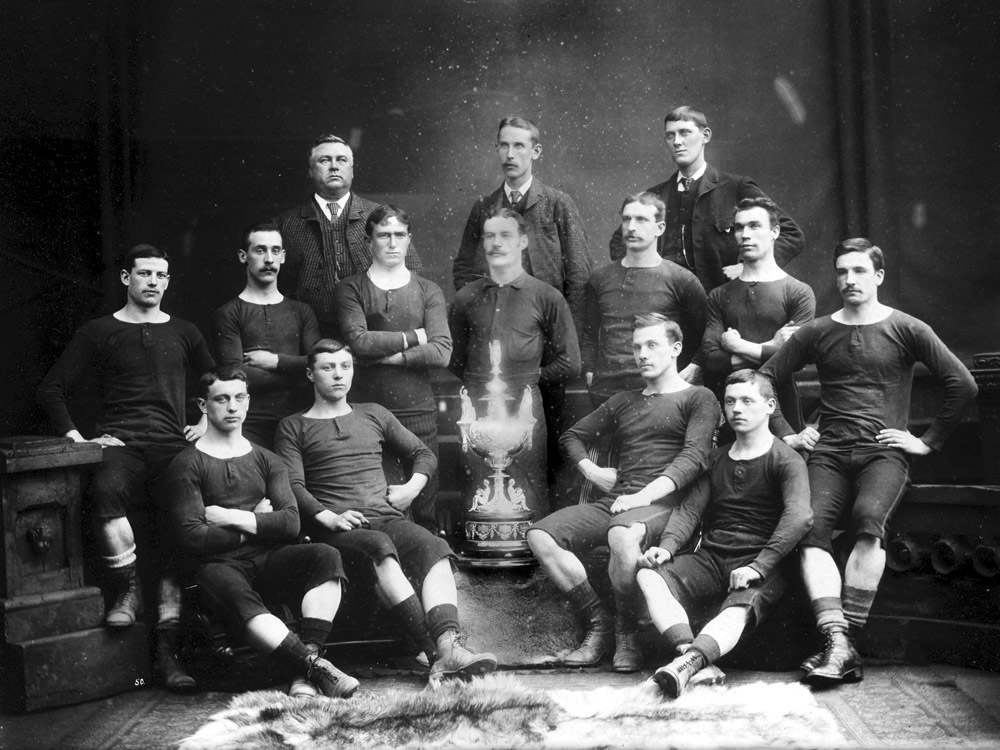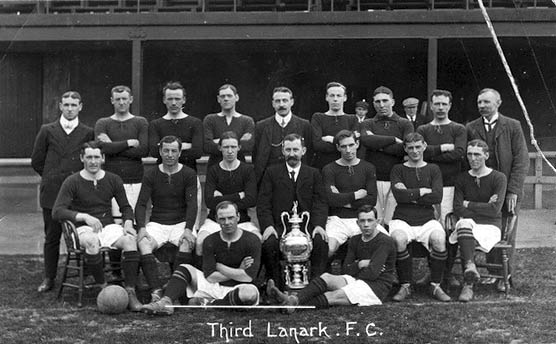|
Albie Murphy
Albert "Albie" Murphy (November 1930 in Dublin – June 2000 in Dublin) was an Irish former professional football player. He joined Clyde in Scotland from Transport in 1949, but returned to Ireland with Shamrock Rovers in 1951. He then rejoined Clyde for many years winning the Scottish Cup with them twice in 1955 and 1958. He resigned for Shamrock Rovers again in September 1959 for £750. Murphy was forced to move as he was barred from Scottish football. He had become a bookmaker and opened a betting shop in Dublin and rendered himself ineligible to continue to play in the Scottish League. He took over as coach in September 1960 for one season. Murphy was capped by Ireland once in a friendly on 19 October 1955, playing in a defeat to Yugoslavia at Dalymount Park. In addition, he represented the League of Ireland XI against the Scottish League XI in 1949. Murphy was known for his fiery temper, with two notable instances of this occurring in games against Rangers. He was sent ... [...More Info...] [...Related Items...] OR: [Wikipedia] [Google] [Baidu] |
Dublin
Dublin (; , or ) is the capital and largest city of Republic of Ireland, Ireland. On a bay at the mouth of the River Liffey, it is in the Provinces of Ireland, province of Leinster, bordered on the south by the Dublin Mountains, a part of the Wicklow Mountains range. At the 2016 census of Ireland, 2016 census it had a population of 1,173,179, while the preliminary results of the 2022 census of Ireland, 2022 census recorded that County Dublin as a whole had a population of 1,450,701, and that the population of the Greater Dublin Area was over 2 million, or roughly 40% of the Republic of Ireland's total population. A settlement was established in the area by the Gaels during or before the 7th century, followed by the Vikings. As the Kings of Dublin, Kingdom of Dublin grew, it became Ireland's principal settlement by the 12th century Anglo-Norman invasion of Ireland. The city expanded rapidly from the 17th century and was briefly the second largest in the British Empire and sixt ... [...More Info...] [...Related Items...] OR: [Wikipedia] [Google] [Baidu] |
Yugoslavia National Football Team
The Yugoslavia national football team; hr, Jugoslavenska nogometna reprezentacija; sl, Jugoslovanska nogometna reprezentanca; mk, Фудбалска репрезентација на Југославија, Fudbalska reprezentacija na Jugoslavija represented Yugoslavia in international association football. Although the team mainly represented the pre-war Kingdom of Yugoslavia and the post-war SFR Yugoslavia, various iterations of the state were formally constituted in football, including the: * Kingdom of Serbs, Croats and Slovenes (1918–1929) * Kingdom of Yugoslavia (1929–1945) * Democratic Federal Yugoslavia (1945) * Federal People's Republic of Yugoslavia (1945–1963) * Socialist Federal Republic of Yugoslavia (1963–1992) It enjoyed success in international competition, finishing in fourth place at the 1930 and 1962 FIFA World Cups. In 1992, during the Yugoslav wars, the team was suspended from international competition as part of the United Nations sanctions o ... [...More Info...] [...Related Items...] OR: [Wikipedia] [Google] [Baidu] |
Republic Of Ireland International Footballers
A republic () is a "state in which power rests with the people or their representatives; specifically a state without a monarchy" and also a "government, or system of government, of such a state." Previously, especially in the 17th and 18th centuries, the term was used to imply a state with a democratic or representative constitution (constitutional republic), but more recently it has also been used of autocratic or dictatorial states not ruled by a monarch. It is now chiefly used to denote any non-monarchical state headed by an elected or appointed president. , 159 of the world's 206 sovereign states use the word "republic" as part of their official names. Not all of these are republics in the sense of having elected governments, nor is the word "republic" used in the names of all states with elected governments. The word ''republic'' comes from the Latin term ''res publica'', which literally means "public thing", "public matter", or "public affair" and was used to refe ... [...More Info...] [...Related Items...] OR: [Wikipedia] [Google] [Baidu] |
Republic Of Ireland Association Footballers
A republic () is a "state in which power rests with the people or their representatives; specifically a state without a monarchy" and also a "government, or system of government, of such a state." Previously, especially in the 17th and 18th centuries, the term was used to imply a state with a democratic or representative constitution (constitutional republic), but more recently it has also been used of autocratic or dictatorial states not ruled by a monarch. It is now chiefly used to denote any non-monarchical state headed by an elected or appointed president. , 159 of the world's 206 sovereign states use the word "republic" as part of their official names. Not all of these are republics in the sense of having elected governments, nor is the word "republic" used in the names of all states with elected governments. The word ''republic'' comes from the Latin term ''res publica'', which literally means "public thing", "public matter", or "public affair" and was used to refer t ... [...More Info...] [...Related Items...] OR: [Wikipedia] [Google] [Baidu] |
Glasgow Merchants Charity Cup
The Glasgow Merchants' Charity Cup was a knockout football tournament open to teams from in and around Glasgow and later on in the tournament's history, teams from outwith Glasgow. Invitations were made and sent out by the Glasgow Charity Cup Committee (GCCC) at their discretion, but no criteria were ever published. Like many domestic competitions in Scottish football, it was dominated by the Old Firm of Rangers and Celtic, with 31 and 28 victories each respectively. In the latter years of the tournament, it ceased being a knockout tournament and became a one-off contest between a Glasgow Select and a team invited from the English League. Clubs The early years of the tournament featured teams from outside Glasgow. The committee often invited teams based on name and popularity.THE GLASGOW CHARIT ... [...More Info...] [...Related Items...] OR: [Wikipedia] [Google] [Baidu] |
List Of Winners Of The Scottish First Division And Predecessors
A national second tier of Scottish league football was established in season 1893–94, as Division Two. Until the 1921–22 season, promotion was not automatic but decided by Scottish Football League clubs on a ballot basis, thus some champion teams were able to retain the title. In the 1946–47 season it became known as the B Division before being changed back to Division Two for season 1955–56. The second tier became known as the First Division in season 1975–76, when the top division (Division One) became the Premier Division, although its status within the Scottish football league system league system changed in 1998–99 when clubs from the top tier (Premier Division) broke away to form the Scottish Premier League. The First Division was still the second tier in the Scottish league system, but was the top level of the Scottish Football League rather than the second. The Scottish Premier League and Scottish Football League merged in 2013 to form the Scottish Profes ... [...More Info...] [...Related Items...] OR: [Wikipedia] [Google] [Baidu] |
Scottish Football Association
The Scottish Football Association (also known as the SFA and the Scottish FA; sco, Scots Fitba Association; Scottish Gaelic: ''Comann Ball-coise na h-Alba'') is the Sport governing body, governing body of association football, football in Scotland and has the ultimate responsibility for the control and development of football in Scotland. Members of the SFA include List of football clubs in Scotland, clubs in Scotland, affiliated national associations as well as local associations. It was formed in 1873, making it List of Football Associations by date of foundation, the second oldest national football association in the world. It is not to be confused with the Scottish Rugby Union, Scottish Football Union, which is the name that the SRU was known by until the 1920s. The Scottish Football Association, along with FIFA and the other Countries of the United Kingdom, British governing bodies, sits on the International Football Association Board which is responsible for the Laws of t ... [...More Info...] [...Related Items...] OR: [Wikipedia] [Google] [Baidu] |
Police
The police are a constituted body of persons empowered by a state, with the aim to enforce the law, to ensure the safety, health and possessions of citizens, and to prevent crime and civil disorder. Their lawful powers include arrest and the use of force legitimized by the state via the monopoly on violence. The term is most commonly associated with the police forces of a sovereign state that are authorized to exercise the police power of that state within a defined legal or territorial area of responsibility. Police forces are often defined as being separate from the military and other organizations involved in the defense of the state against foreign aggressors; however, gendarmerie are military units charged with civil policing. Police forces are usually public sector services, funded through taxes. Law enforcement is only part of policing activity. Policing has included an array of activities in different situations, but the predominant ones are concerned with the pre ... [...More Info...] [...Related Items...] OR: [Wikipedia] [Google] [Baidu] |
Glasgow Cup
The Glasgow Cup is a football tournament open to teams from Glasgow, Scotland. Operated by the Glasgow Football Association, it was competed for annually by senior Glasgow clubs from 1887 until 1989. It is now (since the 2019–20 amended rules) competed for between the senior teams of Clyde, Partick Thistle and Queen's Park and the youth teams of Celtic and Rangers, and has used both knockout and round robin formats to determine the finalists. The cup was dominated by the city's Old Firm rivals, Rangers and Celtic, who won the competition 44 times and 29 times respectively (including one shared win) while it was a senior competition. Only five times did the final not feature either Rangers or Celtic (1889, 1915, 1946, 1947, and 1989). The advent of European football led to the Glasgow Cup becoming less valued, and the tournament did not take place at all or was not finished several times in its later years. Since it was reinstated for youth teams, Rangers have won a further ... [...More Info...] [...Related Items...] OR: [Wikipedia] [Google] [Baidu] |


.png)


